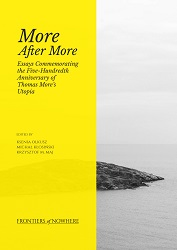
We kindly inform you that, as long as the subject affiliation of our 300.000+ articles is in progress, you might get unsufficient or no results on your third level or second level search. In this case, please broaden your search criteria.


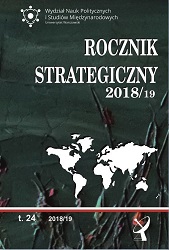
The article discusses the functioning of NATO in 2018. It describes thedeterminants of relations between the allies in this period, especially the impactDonald Trump’s first year as President and growing populist tendencies in Europehave on transatlantic ties. It also discusses the key points of dispute between theallies (e.g. the debates over burden-sharing between NATO members) and assessesthe most important reforms of the Alliance that are meant to increase its operationalreadiness particularly in the context of deterrence and collective defence. NATO’soperational activity was also analyzed as well as the changes in relations with theorganization’s external partners.
More...
The article discusses the evolution and functioning of the Common Security andDefence Policy of the EU in 2018. The authors start with an analysis of externaland internal determinants of cooperation within CSDP, with particular attention tothe impact of transatlantic relations and US approach to the European initiativesas well as of internal tensions in the EU. Then they discuss the implementation ofthe decisions from December 2017 on the initiation of PESCO, which constitutesthe central topic of the paper. The functioning of European Defence Fund is alsoanalyzed, as well as the essence and implications of the French proposal of EuropeanIntervention Initiative (E2I). In the last part of the article, operational engagementof the EU is briefly presented, including a discussion of modifications of CSDPand ways of implementing them, namely Civilian CSDP Compact (CCC), and thedebates over the future of maritime activities of the EU in the Mediterranean. Theauthors conclude with an assessment of the results of the development of PESCOand EDF in the last year and of the perspectives of future cooperation.
More...
The article presents the activities of the UN Security Council in 2018 in lightof the Secretary General’s statements concerning the state of the world. The firstpart is devoted to drafts of resolutions on the Middle East, which were vetoed bypermanent members of the Security Council. The second one is focused on decisionsconcerning African states such as the Republic of Central Africa, Sudan, SouthSudan, Democratic Republic of Congo, Mali, and Somalia; as well as on thematicresolutions concerning peacebuilding, protection of civilians and children in armedconflicts, the role of youths for peace and security. In the third part, basic data on peacekeeping are presented and some violations of peacekeeping rules described.A separate part is devoted to Poland’s activities within the SC and in particular itsengagement in promoting international law.
More...
The aim of the article is to present the major armed conflicts – the wars in threeMiddle East countries: Syria, Iraq, and Afghanistan. The selection criteria includenot only geographic factors, but also the nature of the conflicts, i.e. they are allcivil wars and have become internationalized as a result of involvement of externalpowers, i.e. the military forces of several countries. In Syria, Iraq, and Afghanistan the enemy has been the so called Islamic State; in Syria it was the main enemy. Thethree countries were the most impacted by terrorism.
More...
The aim of this article is to analyze the conflicts which were ongoing in 2018,in Yemen and Africa. The selection of armed conflicts was made on the basis ofthree main criteria: intensity, i.e. the scale of battle-deaths; internationalization, i.e.military involvement of third countries; the activities of jihadist groups. The articlediscusses armed conflicts in the Sahel region and the Lake Chad, in Libya, Somalia,and Yemen. As part of the Strategic Yearbook series that reviews current armedconflicts, this study is a continuation of the analyses from previous years. Its purposeis to explore the conditions and dynamics of the 2018 armed conflicts and theirimplications for international security. It explains the reasons of their increasingintensity and internationalization. The expansion of jihadist groups, especiallythose related to IS (Islamic State of Iraq and Levant, the so called Islamic State) orAl-Qaeda (AQ), is perceived as an important factor in this regard. It is argued thatthe activity of armed jihadist groups leads also to greater military involvement ofWestern states.
More...
The article offers an analysis of the most important energy market trends from theperspective of their importance for energy security and climate change. The energyand climate systems are two areas of human activity strongly influencing each other.On the one hand, the way energy is produced and consumed influences the globalclimate system, on the other hand, climate policy impacts energy security. The articletherefore focuses on the directions and dynamics of changes taking place in theenergy sector and which are of particular importance for global reductions of CO2emissions. It gives an insight into the policies of the world’s largest consumers offossil fuels and into the extent to which their activities favour energy transformation.This analysis critically assesses the feasibility of achieving the global climate policytargets set in 2015 in Paris. Especially importantly for the Strategic Yearbook, the2018 events and current trends serve as points of reference: the article outlines theconditions and results of climate negotiations of COP24 held in Poland and thenewest IPCC report on Global Warming of 1.5°C. An analysis of demand-supplytrends, recent trends in the area of CO2 emissions as well as current events leads toconclusions concerning some long-term challenges for energy and climate security.
More...
The second year of Donald Trump’s presidency was not a time of breakthroughs orevents of historical significance. However, there have been some signs foreshadowingsignificant changes for the US.After Trump’s two years in office, the economy is still booming, although afteryears of prosperity one could expect slowdown in the nearest future. In domesticpolitics, the President focused on fulfilling his campaign promises and supportingthe Republicans in maintaining the majority in Congress after the midterm elections.The greatest obstacles for accomplishing Trump’s election goals include: growingconflicts between the President and Democrats, problems related to the investigationby the special prosecutor R. Mueller’s commission, instability and rotation at the toppositions in the administration, and the President’s war with the news media.The “America First” approach continued to dominate in the field of foreignpolicy. The President concentrated his efforts on disposing of Obama’s legacy andimplementing initiatives aimed at protecting the interests of the US and of Americancitizens. However, the lack of a clear vision and consistency in foreign policy,disputes within the administration, a stiffer position and tightening of dialogue withforeign partners led to a further drop in confidence and loss of US credibility on theinternational arena.In general, in fulfilling the vision of Making America Great Again, D. Trump usesmethods and means which are far from the standards previously known in Americanpolitics. As a result, the nature of American domestic and foreign policy is changing.It is an open question, however, whether the processes will prove permanent, to whatextent, and, if so, how will it affect the US political system and international order.
More...
In 2018, even though Vladimir Putin’s mandate was formally confirmed ina presidential election, his approval ratings fell significantly, particularly becauseof his highly unpopular decision to raise the retirement age substantially. Thedecision was one of the ways of seeking savings and building reserves in case theeconomic situation became worse as a result of multiplying American sanctionsand changes in the energy resources market. It was a challenge for the Kremlin, andthe Russian government looked for a way to strengthen the political legitimacy ofPutin’s rule while trying to keep their foreign policy directions unchanged withoutunduly escalating the conflict with the US. Russia attempted to make use of growingtransatlantic tensions while looking to normalize its relations with the main WesternEuropean countries and tightening its unequal anti-American quasi-alliance withChina.
More...
The article aims to analyze the region of Eastern Europe and South Caucasusfrom the perspective of the EU Eastern Partnership programme. Ten years afterits initiation, the region remains unstable both politically and militarily. It is stillstruggling with post-Soviet heritage, such as corruption and authoritarian tendencies.While some countries (Armenia) try to counter these challenges, in others (Moldova)there was a significant deterioration of democratic standards. Such a situationseems to indicate the weakness of the EU’s policy mechanisms towards its Easternneighbourhood.According to the EaP assumptions, the cooperation with the countries of theregion is conducted on the case by case basis. This results in the separation of theEastern neighbours of the EU into two subgroups: the first one is made up of Ukraine,Moldova, and Georgia, which in 2014–2017 concluded association agreements withthe EU, providing for the creation of Deep and Comprehensive Free Trade Areas,and were offered a visa-free regime; the second one gathers Belarus, Armenia, andAzerbaijan, with which cooperation is more limited.Russia’s policy remains a key challenge both for the countries of the region and theEU. The Russian Federation is striving both to increase its influence in the countriesof Eastern Europe and South Caucasus, and to limit their cooperation with the EU.An important instrument, though not the only one, of the expansive Russian policyin the region are the frozen conflicts affecting Ukraine, Moldova, Georgia, Armenia,and Azerbaijan. In the case of Belarus, progressive integration of this country withRussia should not be excluded.
More...
After several years in which the reports from the Middle East were dominated bynews on the fight against the Islamic State, in 2018 there was a significant change.A series of failures of IS in 2016-2017 led to the situation in which the basic questionconcerning the Middle East focussed not so much on the way to overcome theorganization, but rather on the essence of the new international order, shaped asa result of clashing interests of different states and political forces. In Syria, plungedinto civil war since 2011, the scale of victory clearly shifted to the side of the forcesfaithful to President Bashar al-Assad. In Iraq, after a period of cooperation of differentpolitical forces faced with IS expansion, ethnic and confessional divisions revivedagain. At the same time, mechanisms for seeking effective ways to eliminate threatsto the stability of the country have been introduced. Conflicts in Libya and Yemenare still far from settled. Both countries have no governments that can effectivelycontrol the situation in their territories and external actors get involved to furthertheir particular interests. Local conflicts thus become a playing field for competingregional and global powers, hindering stabilization processes.
More...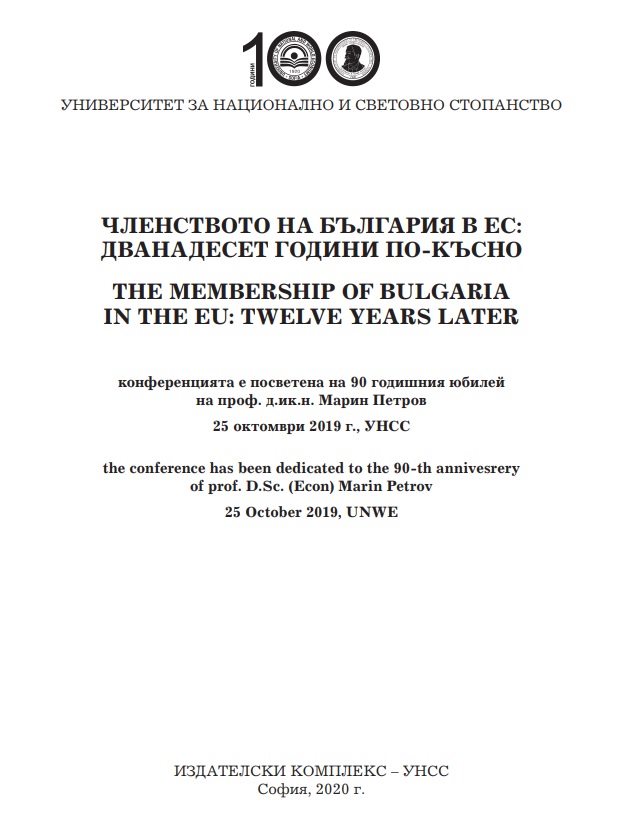
In the process of globalization, refine on the one hand, we must focus on the formation of a rational weakening and geographical structure of implementation and export and over time to take into account the increasing competition in the world markets. It is of particular importance to use and be regarded as members of the World Trade Organization and the favorable prospects evident from NATO and EU membership abroad. The integration process is influenced by no one factor – it compares the level of economic development, geographical proximity to the former, the political will of integrate on the pages, creates the integrated structure of the mechanisms and is created in the Initiative Center by the existing ones, to unite and partners.
More...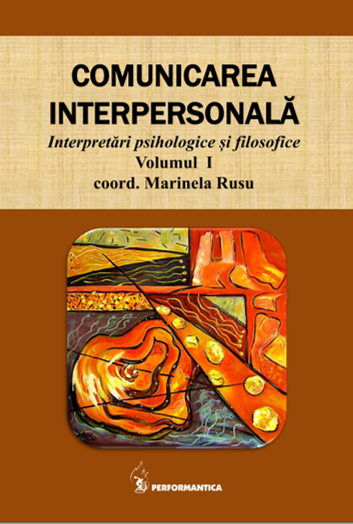
The connotations of the term individualism have been debated many time throughout history, giving it a wide range of meanings, more vague or more precise, depending on those who use it - historians, writers, anthropologists, philosophers of social sciences, politics or political theorists. Each gave it its own meaning and thus integrated it into their work. The promoters of individualism have as their ultimate goal the individual goals and desires, in other words, individualism is the opposite of holism, collectivism, totalitarianism, which support the community objectives of society. The last part of the twentieth century was the period when neoclassical market policies began to dominate the globe. This was due to two series of major events: the crisis of the welfare state and the fall of communism. The triumphalist spirit of this age, present in works such as Francis Fukuyama's "The End of History and the Last Man" was the New Spirit of the New Age. The term individualism was the one that best captured this spirit better than any other.
More...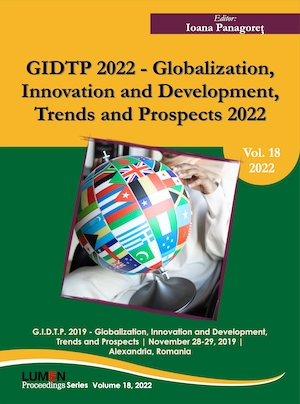
The European Commission (EC) and Romania ensure a shared management of European funds and the principles governing the current financial framework are those of sound financial management. For each operational program, European regulations make mandatory the existence of the following authorities: the management body (MA), the certifying body (CA) and the audit institution (AA), which must operate independently of each other. Each Member State has the freedom to create its own institutional framework, if the three authorities mentioned in the European regulations are clearly defined and delineated.The present article aims to present whether the management and control system (MCS) implemented at the Romanian level is too bureaucratic if too many authorities have been created on the European Commission's cash flow. At the same time, some of the main causes will be identified, which may lead to a lack of beneficiaries' interest in accessing the funds allocated to certain programs. Some of these cases originate from the 2007-2013 programming period where Romania was sanctioned by the European Commission with many financial corrections due to systemic irregularities identified in the process of public procurement procedure, the evaluation and selection process projects. At the same time, the lack of funding due to the failure to complete some projects in time in December 2015 will be considered, as it is compulsory to ensure the necessary public and private financial resources from the own local budgets or from the state budget in order to be able to be finished.
More...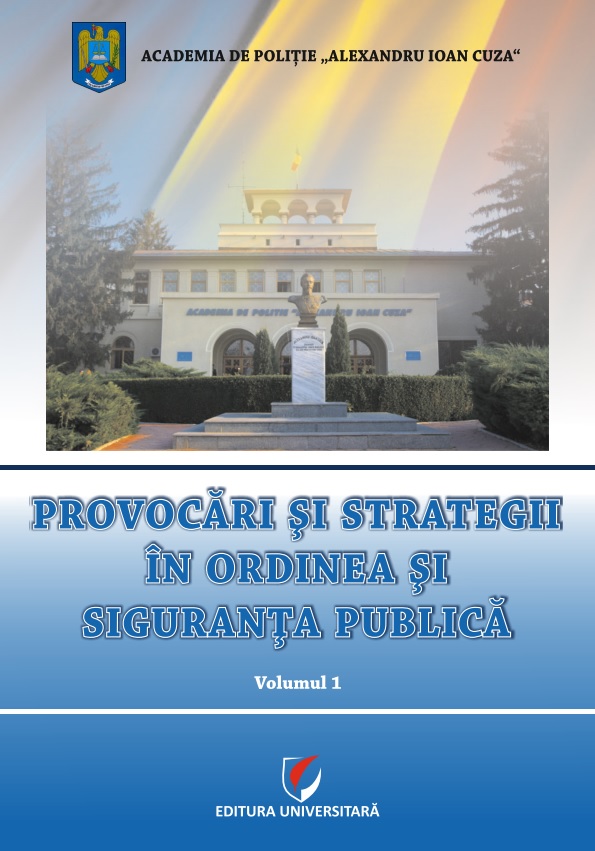
As an EU member, Romania must applies the rules of the Union in all areas covered by it, including home affairs, in order to provide Romanian citizens and European citizens with the assurance of fundamental rights and freedoms. This paper aims to address Romania’s obligation to apply EU law in the police field from two perspectives: The advantages of a uniform framework for the application of regulations on this subject, but also the challenges resulting from the need to include them at national level. As a novelty element and with the conviction that the academic environment is a good one for debates, I intend to integrate in the proposed paper information obtained from the dialog conducted through artificial intelligence in the form of ChatGPT, As a result of the controversies raised in the academic world and to identify whether artificial intelligence of this type can formulate pertinent arguments regarding the application of EU home affairs legislation in Romania.
More...
Through the system of lessons identified, those features can be identified that have the potential to make the work of security organisations more effective. In this context, a viable lessons learned system has been adapted and implemented at NATO level and has become a fundamental strategic component of the management system responsible for organisational development. The implementation of the Lessons Learned System at the level of the Ministry of Internal Affairs arose also from the need to have a mechanism that would allow the transfer of knowledge in an efficient and rapid way to all staff, against the background of a particular staff dynamic, the model being mainly the one adopted at NATO level that has proven successful over time. The lessons learnt system at Ministry of Internal Affairs level has been institutionally adapted from the one developed at NATO level, which was previously taken over also by the Ministry of National Defence. Lessons learned implemented on the basis of the NATO model are of value through their use in: the planning of actions carried out by military organisations and those responsible for maintaining, ensuring and restoring public order; ensuring interoperability between the structures of the Ministry of Internal Affairs and the Ministry of National Defence; the development of operational, procedural and technical standards; the field of logistical procurement; the field of education.
More...
Dans l’article « Le paratexte, l’incipit et la clôture narrative dans le roman policier Maigret se trompe de Georges Simenon » nous cherchons à découvrir les éléments paratextuels (titre, nom de l’écrivain, incipit, clôture narrative, etc.) que Georges Simenon, l’un des plus grands auteurs de romans policiers, père du fameux commissaire Maigret a choisi d’utiliser dans son roman, dans le but d’augmenter l’envie des lecteurs pour acheter son livre. Tous ces éléments ont le rôle d’offrir au lecteur les premières informations sur le livre qu’il a choisi pour lire, en l’aidant à se situer dans une perspective adéquate, « puisque s’y conjuguent la reconnaissance d’une appartenance d’un livre à un auteur (et à l’ensemble d’une œuvre) et la mise en relation de l’ouvrage à la personnalité historique que désigne le nom » .
More...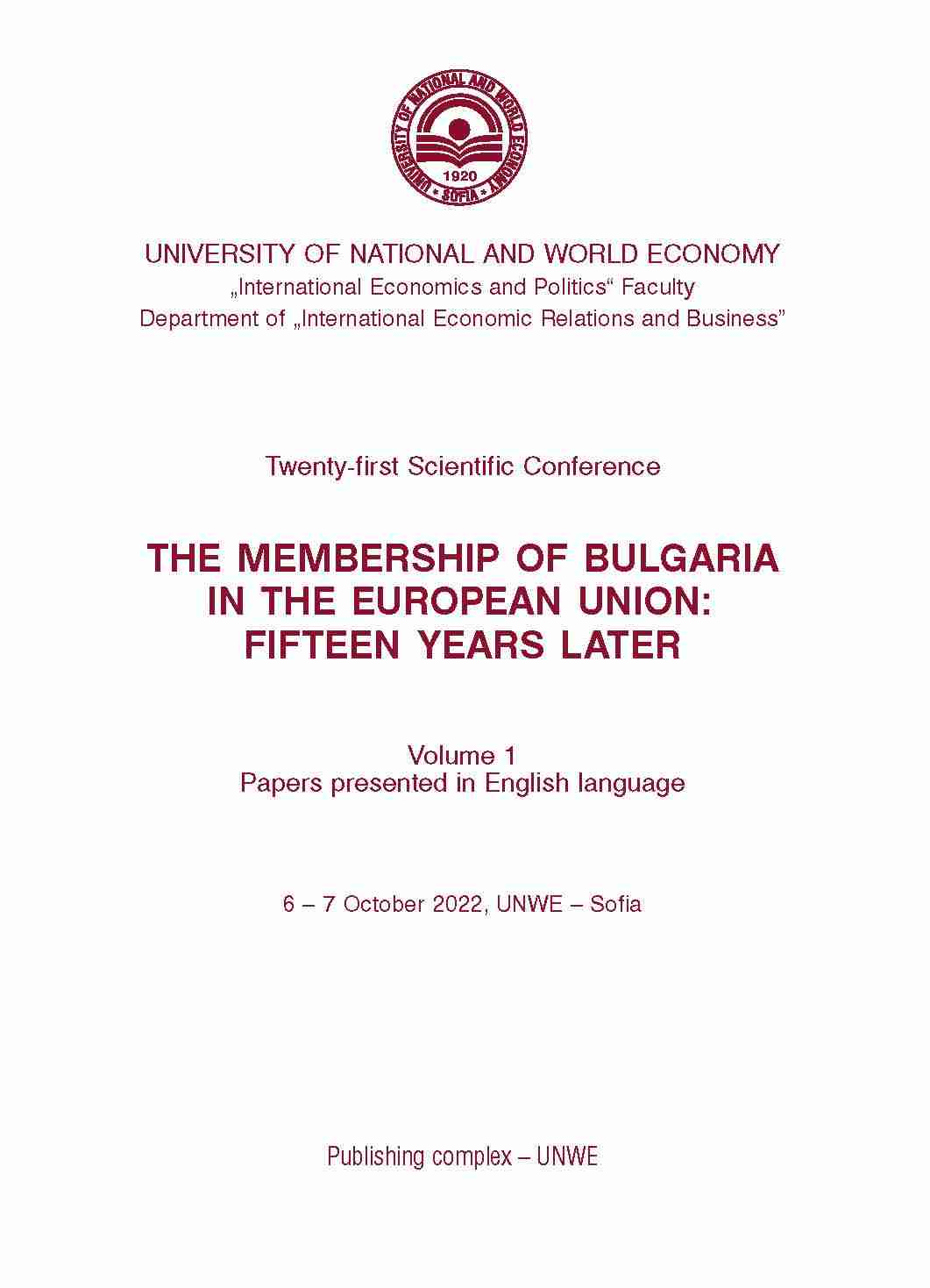
The development of a country (economic and social) is one of the key issues in modern society. For this reason, it is an object of increased research interest - with different research goals and objectives, as well as with a different methodology used for this research. One of the categories often used in modern economic life is competitiveness. It is the focus of the present study, which has as its main objective the analysis, assessment and comparison of the competitiveness with which the Bulgarian economy functions in the context of its membership in the European Union.
More...
The report analyzes the structure and convergent processes of employment in the Bulgarian and Romanian economies for the period 2000-2020, and examines the dynamics of relative shares and rates of change for the respective period. In order to quantitatively measure the degree of convergence/divergence, a divergence index and a difference index were calculated, comparisons with other EU countries with similar characteristics were used, and some possible explanations and consequences of the structural changes that took place were also derived. Overall, the results show a slow process of convergence of the sectoral structure of employment of the Bulgarian and Romanian economies with that of the Eurozone, which continues throughout the period, regardless of some specifics before and after the global recession.
More...